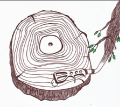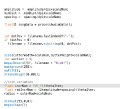No edit summary |
No edit summary |
||
| Line 1: | Line 1: | ||
==WoodenRecord== | ==WoodenRecord== | ||
I want to | I want to produce a vinyl record out of a piece of tree trunk using a Lasercutter for engraving a .wav file playing recorded natural noises into it. Later on i want to expose a second trunk after the cutting part back again into nature for half a month to give it back to it and see how that influences the sounds. <br> | ||
<gallery> | |||
image:woodrecord1.png | | |||
image:IMG_8103.png | Wood i want to cut in: Oak | |||
image:IMG_8104.png | Wood i want to cut in: Birch | |||
</gallery> | |||
==Process== | |||
First im sending an edited .wav file into an wav to text editor using an Python Code, the wav. file needs to be amplified and high sounds needs to be pitched otherwise they are not recognisable in the cut for the needle. The .wav to .txt code analyses the soundwaves and recreates it into coordinates that would build an round spiral with the sound information readable for an Vinyl player on it. | |||
<gallery> | |||
image:Screen_Shot_2016-04-07_at_17.56.49.png | Python code | |||
image:Screen_Shot_2016-04-07_at_17.53.50.png | .txt file | |||
</gallery> | |||
With this txt. file full of coordinates im feeding an Processing code wich is turning them in an actual Vector file. Cause of the big amount of data the path gets split into 7 separate .pdf files. | |||
<gallery> | |||
image:Screen_Shot_2016-04-07_at_17.56.01.png | Processing code | |||
</gallery> | |||
Here you see the vector file from the original .wav converted through Python and then Processing. | Here you see the vector file from the original .wav converted through Python and then Processing. | ||
< | |||
<gallery> | |||
image:woodrecord3.png | Vector file | |||
image:Screen_Shot_2016-04-07_at_17.59.07.png| Detail | |||
image:Screen_Shot_2016-04-07_at_18.02.15.png| Detail | |||
</gallery> | |||
==Current State== | |||
At the moment im fine tuning the audio quality, also some problems with cutting on a rougher surface than mdf plates needs to get fixed. | |||
One big problem of cutting the file into an real slice of an tree trunk are the different degrees of hardness of the year rings of the tree, the laser will cut into weaker areas deeper than into harder and older ones. | |||
After fixing these problems i can finally expose them back to nature, to see how the sound reacts to being rotten. | |||
Test with mfd plate. | |||
<gallery> | |||
image:Screen_Shot_2016-04-07_at_17.56.01.png | Processing code | |||
</gallery> | |||
You can view a video of the first test with amplified audio [https://www.youtube.com/watch?v=lGxN1MoKIOA&feature=youtu.be here]. | |||
Revision as of 16:45, 7 April 2016
WoodenRecord
I want to produce a vinyl record out of a piece of tree trunk using a Lasercutter for engraving a .wav file playing recorded natural noises into it. Later on i want to expose a second trunk after the cutting part back again into nature for half a month to give it back to it and see how that influences the sounds.
Process
First im sending an edited .wav file into an wav to text editor using an Python Code, the wav. file needs to be amplified and high sounds needs to be pitched otherwise they are not recognisable in the cut for the needle. The .wav to .txt code analyses the soundwaves and recreates it into coordinates that would build an round spiral with the sound information readable for an Vinyl player on it.
With this txt. file full of coordinates im feeding an Processing code wich is turning them in an actual Vector file. Cause of the big amount of data the path gets split into 7 separate .pdf files.
Here you see the vector file from the original .wav converted through Python and then Processing.
Current State
At the moment im fine tuning the audio quality, also some problems with cutting on a rougher surface than mdf plates needs to get fixed.
One big problem of cutting the file into an real slice of an tree trunk are the different degrees of hardness of the year rings of the tree, the laser will cut into weaker areas deeper than into harder and older ones.
After fixing these problems i can finally expose them back to nature, to see how the sound reacts to being rotten.
Test with mfd plate.
You can view a video of the first test with amplified audio here.








